Related Research Articles

The Igbo people are an ethnic group in Nigeria. They are primarily found in Abia, Anambra, Ebonyi, Enugu, and Imo States. Ethnic Igbo populations are found in Cameroon, Gabon, and Equatorial Guinea, as migrants as well as outside Africa. There has been much speculation about the origins of the Igbo people, which are largely unknown. The Igbo people are one of the largest ethnic groups in Africa.

Enugu is the capital city of Enugu State in Nigeria. The city had a population of 4,690,100 spread across the three LGAs of Enugu East, Enugu North and Enugu South, according to the 2022 Nigerian census.
Anarchism in Nigeria has its roots in the organization of various stateless societies that inhabited pre-colonial Nigeria, particularly among the Igbo people. After the British colonization of Nigeria, revolutionary syndicalism became a key factor in the anti-colonial resistance, although the trade union movement deradicalized and took a more reformist approach following the country's independence. The contemporary Nigerian anarchist movement finally emerged from the left-wing opposition to the military dictatorship in the late 1980s and saw the creation of the Awareness League.

Cinema of Africa covers both the history and present of the making or screening of films on the African continent, and also refers to the persons involved in this form of audiovisual culture. It dates back to the early 20th century, when film reels were the primary cinematic technology in use. As there are more than 50 countries with audiovisual traditions, there is no one single 'African cinema'. Both historically and culturally, there are major regional differences between North African and sub-Saharan cinemas, and between the cinemas of different countries.
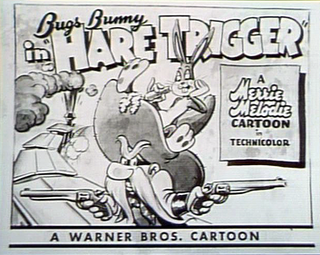
Hare Trigger is a 1945 Merrie Melodies cartoon directed by Friz Freleng. The cartoon was released on May 5, 1945, and features Bugs Bunny. The short featured the first appearance of Yosemite Sam, as well as the first short to credit (almost) the whole animation staff who worked on the short.
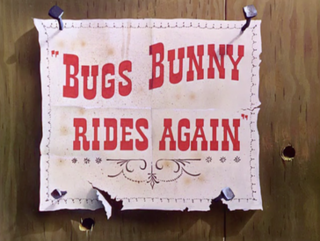
Bugs Bunny Rides Again is a 1948 Merrie Melodies animated short directed by Friz Freleng. The short was released on June 12, 1948, and stars Bugs Bunny and Yosemite Sam.
The Adventures of Captain Africa is a 1955 adventure serial film directed by Spencer Gordon Bennet and starring John Hart.
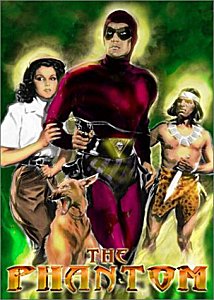
The Phantom is a 1943 15-chapter cliffhanger superhero serial, produced by Rudolph C. Flothow, directed by B. Reeves Eason, and starring Tom Tyler in the title role. It is based on Lee Falk's comic strip The Phantom, first syndicated to newspapers in 1936 by King Features Syndicate. The serial also features Jeanne Bates as the Phantom's girlfriend Diana Palmer, and Ace the Wonder Dog as the Phantom's trusted German shepherd Devil.
The Lightning Express is a 1930 American pre-Code Universal film serial, featuring the adventures of "Whispering Smith". This serial is considered a lost film.

Jungle Mystery is a 1932 American pre-Code Universal 12-chapter movie serial directed by Ray Taylor. The serial was based on a book called The Ivory Trail by Talbot Mundy. A 1935 feature version was also released, edited down to 75 minutes.
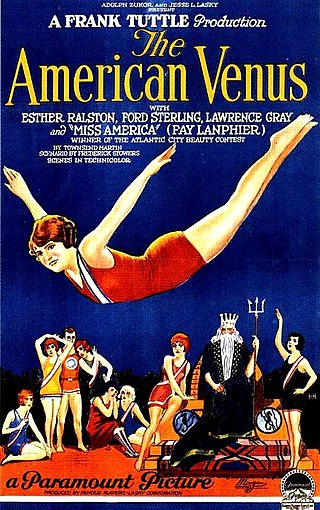
The American Venus is a 1926 American silent comedy film directed by Frank Tuttle, and starring Esther Ralston, Ford Sterling, Lawrence Gray, Fay Lanphier, Louise Brooks, and Douglas Fairbanks Jr. The film was based on an original story by Townsend Martin. The scenario was written by Frederick Stowers with intertitles by Robert Benchley.
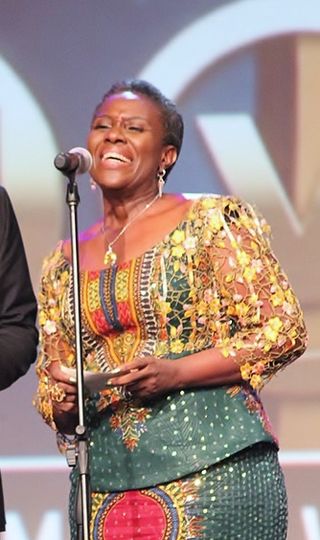
Joke SilvaMFR is a veteran Nigerian actress, director, and businesswoman.

Miraculous Journey is a 1948 film about seven airplane passengers who find themselves stranded in an African jungle after their plane crashes. It was directed by Sam Newfield, under the pseudonym of Peter Stewart. The film stars Rory Calhoun and Virginia Grey.

Huddle is a 1932 American pre-Code sports drama film directed by Sam Wood and starring Ramon Novarro, Madge Evans, Ralph Graves and Una Merkel. This was the first of two films Ramon Novarro would make in 1932, and his first after appearing in the acclaimed, successful Mata Hari.

Filmmaking in Colonial Nigeria generally refers to an era in Nigerian cinema, usually spanning the 1900s through to the 1950s, when film production and exhibition or distribution were controlled by the British colonial Government. The history of cinema in Nigeria dates back to as early as the history of film itself; notably in the late 19th century, with the use of peephole viewing of motion picture devices. These were soon replaced in the early 20th century with improved motion picture exhibition devices, with the first set of films screened at the Glover Memorial Hall in Lagos from 12 to 22 August 1903.

Palaver, otherwise known as Palaver: A Romance of Northern Nigeria, is a 1926 silent film shot in British Nigeria; it is recognized today as the first Nigerian feature film.
Walter Futter was a film producer and director in the United States. After an initial career cutting and editing films, Futter began writing and producing his own shorts and movies, often using footage he acquired. He had success with Africa Speaks!, a popular movie, which combined Paul L. Hoefler's footage filmed in the field, staged scenes filmed in Los Angeles, and narration by Lowell Thomas. He produced more than 250 short films, including series of shorts entitled Walter Futter's Traveloques and Walter Futter's Curiosities. Hoot Gibson starred in a number of his western films. Another of his more than 50 longer films was Jericho, also called Dark Sands.
Cinema of Zambia refers to the cinema and film industry of the country of Zambia.
The cinema of São Tomé and Príncipe does not have an extensive history, since São Tomé and Príncipe is not a large island. However there has been some filmmaking.
References
- ↑ Larry Richards (27 May 2005). African American Films Through 1959: A Comprehensive, Illustrated Filmography. McFarland. pp. 59–. ISBN 978-1-4766-1052-8.
- ↑ Steven G. Ohrn; Rebecca Riley (1976). Africa from real to reel: an African filmography. African Studies Association. p. 42. ISBN 978-0-918456-01-4.
- ↑ Human Resources Research Organization (1967). Technical Report. p. vii.
- ↑ Sam Zebba (March 2013). Aspects of My Life. iUniverse. pp. 111–113. ISBN 978-1-4759-7472-0.